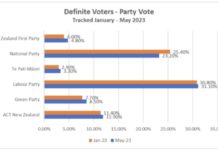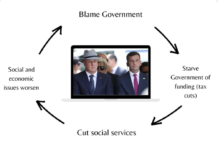United States Pacific diplomatic offensive continues
Regular readers will be starting to see key trends in United States activity in the Pacific region. A deliberate and strategic diplomatic offensive is under-way. The objectives are clearly to block Chinese diplomacy and to secure relationships with strategically important Pacific nations.
United States negotiating to open Tongan embassy
The United States plans to open an embassy in Tonga. The country has a close association with the United States. Tongan soldiers train with the United States and have deployed with American coalitions in both Iraq and Afghanistan.
Establishing an embassy is a diplomatic move to secure the United States relationship with Tonga. It provides the United States with direct access to Tongan diplomatic discussions and the ability to monitor and understand this Pacific nation.
China and Tonga have an interesting relationship, about 4% of the population are ethnically Chinese and this group has suffered some discrimination in the past. In 2006, during riots in Nukualofa Chinse businesses were particularly hard hit by vandals. However, China retains a relatively close relationship with Tonga providing loans and other aid.
An alliance with Tonga provides an influential friend amongst many of the smaller Pacific nations. Tongan soldiers are well-trained, experienced and professional demonstrating their ability to work within coalitions during the Regional Assistance Mission Solomon Islands peace-keeping mission and with American and British forces in Afghanistan and Iraq. It will be interesting to watch how Sino-American competition develops in the Kingdom of Tonga.
President Biden to visit Papua New Guinea
Another example of United States diplomatic interest in the Pacific is the planned visit by President Biden to Papua New Guinea on 22 May during the India-Pacific forum. It is the first time that a United States President has visited Papua New Guinea.
The visit is important, demonstrating the United States’s interest in the Pacific and because Indian Prime Minister Narendra Modi is attending the forum too, providing an opportunity for diplomacy between the United States and India. A country that has not been forthcoming in supporting the United States and NATO over the war in Ukraine.
Pacific watchers should keep an a close eye on this meeting.
Looking ahead – Quadrilateral Security Dialogue Leader’s Summit – 24 May
Get ready, in a couple of weeks the leaders of India, Australia, Japan and the United States plan to meet in Sydney. The Quadrilateral Security Dialogue or the ‘Quad’ is a diplomatic dialogue between India, Australia, Japan and the United States. The dialogue provides an opportunity for military planning and cooperation between members and includes exercises between the partners. The Quad’s first test was the 2008 Boxing Day Tsunami and it contributed to organising a collective response between members.
China, has a long history of discomfort with the Quad because any United States security relationship with India or Japan is strategically dangerous for China. Sino-Indian relations have deteriorated into armed conflict at times; and their shared border is disputed. Further, the Quad provides a basis for Japan and India to cooperate. A strategic issue for China because Japan’s location effectively blocks Chinese access to the North Pacific. Therefore, the Quad is of considerable concern to China who protested extensively about the arrangement. In 2009, the partners placed the dialogue into a period of intermission.
The Quad resumed in 2017 and its role in the security framework of the region is becoming more important. A March 2020 brief by American ‘think tank’ the Centre for Strategic and International Studies describing the background to the Quad’s resumption as follows: “However, eight further years of destabilization in the region led to a growing convergence in foreign policies among the four states, with a focus on securing a free and open Indo-Pacific, taking joint action against terrorism, and promoting a rules-based system. Resultingly, the Quad re-formed in 2017 and began convening on a bimonthly basis.”
In 2019, United States Secretary of State, Mike Pompeo suggested that the dialogue could eventually develop into an Indo-Pacific alliance aimed at containing China. The statements stimulated both Chinese and Australian protests. Australia’s diplomats concerned about the provocative statements.
Another role of the Quad is as a channel for informal engagement with European powers including; the United Kingdom, Canada, France, Germany, the Netherlands and Italy all of which have engaged with the Quad since 2017. Not as members, but rather using the Quad to help develop national policy positions on Indo-Pacific security. European powers are concerned about Indo-Pacific security because they rely on maritime trade and security.
Essentially, the Quad leader’s summit on 24 May is important for anybody with an interest in the Pacific, and the results of the discussion will provide useful information about the member’s future policy in the region.
Papua New Guinea reopens Porgera mine
Progera mine is a large gold and silver mine in the highlands of Papua New Guinea. Like many mines in the Pacific, it has a checkered history. In the past, it brought employment, better health services and education to the local community. However, in the early 2000s the mine employed a large security force, some of which were licenced by the Papua New Guinea government to carry weapons and use lethal force. At the same time there were human rights complaints about the behaviour of some staff at the mine.
The mine shut; and this year there are plans to resume operations. A mining company, Barrick African Gold recently agreeing a deal with the Papua New Guinean government to run the mine. The government agreed to licence the mining operation in exchange for retaining a 51% share of the mine.
A problem with the plan is that the local area is plagued by lawlessness and inter-tribal warfare. Papua New Guinea’s government is not well-resourced and keeping the peace in isolated areas is difficult.
And; this problem could have larger ramifications. Weak governance, insecurity, violence and high profits are a dangerous combination. Historical events, especially in Africa but by no means limited to that region demonstrate that these factors can combine dangerously creating instability. Essentially, if a small nation is not able to secure an area; it sometimes allows a mining company to procure its own security force. Often, security services are contracted from companies in the private military sector. Some private military companies are well-run providing appropriate security services for high-risk areas. However, sometimes they are not and can become a de-stabilising influence in a country.
Papua New Guinea has its own example of problems with private military companies. The Panguna mine on Bougainville Island was the world’s largest copper mine. However, it stopped operating in 1989 after concerns about the mine’s environmental impact; and its effect on local people escalated into a war on Bougainville. The war continued throughout the 1990’s and in 1997, Papua New Guinea’s government signed a secret contract with British/South African private military company Sandline to finish the war and provide sufficient security that the mine could return to production. The plan was thwarted by the intervention of the Papua New Guinea Defence Force. This created a constitutional crisis that could have ended in a military coup. The intervention prevented para-military operations being conducted in Bougainville by Sandline; and was supported by other Pacific nations leading to a peaceful resolution but the results could have been different.
History’s lesson is that if Papua New Guinea’s government cannot provide adequate local security, there will be an argument to hire external contractors. A step that needs to be carefully managed and well governed because it is easy to see the potential for de-stabilising conflicts to arise. Especially, during a period of Sino-American competition because any power wishing to gain; or retain influence in Papua New Guinea will be keen to ensure that ‘their people’ get a lucrative security contract that increases their nation’s influence.
Re-opening this mine could be a significant economic opportunity for the local area and for Papua New Guinea generally. However, it is important that other nations support Papua New Guinea’s government as it works to manage security issues; mindful that collective security and cooperation help to mitigate potentially de-stabilising activities.
Ben Morgan is a bored Gen Xer and TDBs military blogger





It is significant that the US and by association Australia and NZ has upped their diplomatic efforts in the region. Until the US decided on their “pivot to Asian” strategy to “contain” China nobody gave a monkeys for our Pacific neighbours.
Looking forward China is not the issue for Pacific and Australasia. Our US centric focus blinds us to the emergence of Indonesia, the world’s largest Islamic state, and Malaysia. They too, along with other SE Asian states and India will have significant local interest.
We have sat on our hands at Uncle Sam’s bidding for too long. With all respect to the US once China becomes too big an issue to them, their interest in our region will fade as simply too costly. Which leaves us at sea with new shipmates.
Ben – more CIA talking points…come on, write from the point of view of China or Russia, just for once…it would bring balance to your articles…which is sorely needed
Balance?
I will give you balance
Two equally mad maniacs going at each other.
Ben may have picked a side, but so have you,
Pat+O’Dea – Wow! I did not know you could read minds! Wait, you can’t …you just like posting crap.
While he may have a blind spot to the expansionist maneuvers and crimes of Western Imperialism, I find Ben’s reports on the maneuvers and crimes of the Russian and Chinese imperialists accurate.
As to your pro-imperialist partisan leaning, I can only go by your previous comments.
That condemn all western commentators including Ben above as liars.
China is still all upset that their “Global Security Initiative” plan, a plan so cunning you could pin a tail on it and call it a dragon, wasn’t taken up by the Pacific Island community. I mean, who wouldn’t like to have a evil expansionist totalitarian regime looking after the sovereignty of your country. Afterall, it’s just about having a few PLAN missile cruisers floating about your shores. Maybe the odd submarine lurking beneath the waves. A shiny new aircraft carrier even.
Who wouldn’t want that?
All you need to know is shown in that Map? China is surrounded by US Military Bases so who is the real threat because it certainly isn’t China!
Still looking for an explanation why a ‘US base’ is shown between the Hainan Island and mainland China . . no way there is a US base there for a start.
So no one is able to comment on the fictional US overseas base map they are getting so worked up about?
Still waiting . .